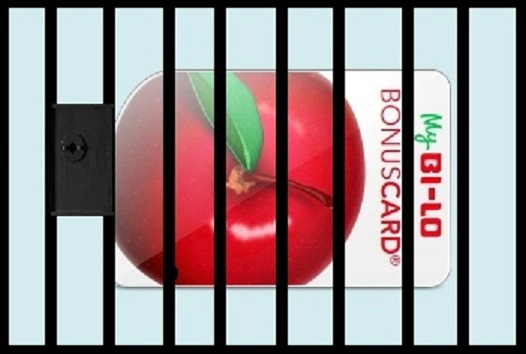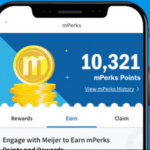Never mind discounts and digital coupons, here’s one way your grocery store loyalty card can help you get stuff for free – just use it to break into someone’s house and steal their food.
That turned out not to be such a great idea for a York, South Carolina man last week. The Herald newspaper reports that a 28-year-old homeowner called police after discovering someone had broken into his home last Thursday. Missing from the home were three frozen dinners and seven coats. But the thief left something behind – his BI-LO Bonuscard, which was found stuck in the door frame.
Investigators contacted the local BI-LO, and a manager helped them identify and locate the card’s owner. Case closed.
Great news for the homeowner, not so great news for the crook, but what does it mean for you? Are stores really so quick to give up your information, just because police think you might have done something wrong?
Well, yes.
It’s not something that most of us even think of – but privacy advocates have, and it gives them fits. Read any loyalty program’s terms of service, and you’ll likely find something similar to this, from Safeway’s privacy policy: “We may disclose personal information as required by law; such as in response to a subpoena, court order or a specific request by a law enforcement agency or as otherwise required by law.”
Nothing to worry about, if you’re a law-abiding citizen. Then again, ask Washington state resident Philip Lyons. In an oft-cited case from 2004, the veteran firefighter was arrested and charged with attempted arson, after police obtained records from his Safeway loyalty card. They learned that he had used his card to purchase a fire starter. Five months later, they discovered they had the wrong guy when someone else confessed to the crime.
In a separate case back in 1998, the Washington Post reported that Smith’s Food and Drug in Arizona said it gave a suspected drug dealer’s information to the Drug Enforcement Administration, which wanted to know whether he had used his loyalty card to buy large supplies of plastic baggies.
Such cases are few and far between, but they’re enough to convince some to swear off loyalty cards, lest their purchases mistakenly be seen as illegal. But precisely because privacy advocates are still citing these cases from nine and 15 years ago, is enough to reassure most others that such incidents don’t happen often enough to pose any real concern.
As for the case in South Carolina last week, when the homeowner found out the culprit’s name, it turned out to have been a friend of his. Some friend. The homeowner decided not to press charges, but no word if he got his coats or frozen food back.
Good thing BI-LO has Stouffer’s frozen meals on sale for $1.98 this week. Of course, the price is only valid if you use your Bonuscard. If you dare.















You never know what’s next with these bonus cards.
Just a few weeks ago I was surprised by an E-Mail that warned me not to consume some p-nut butter I had purchased and to return it to the store.
Turns out-there was a recall. Salmonella.
They knew my name, my, E-mail and where I live. They knew what I bought, where and when I bought it.
At the time I was not concerned about my privacy. (In hindsight, I’m still not.) Have a great day!